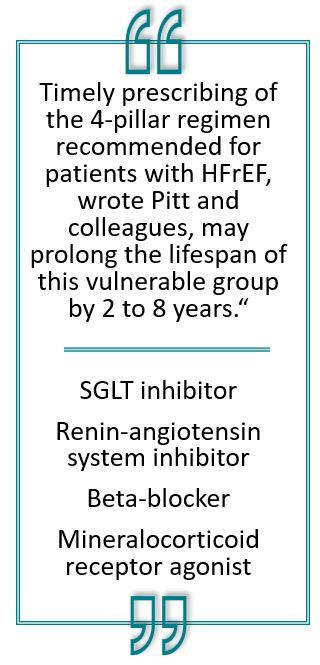- Clinical Technology
- Adult Immunization
- Hepatology
- Pediatric Immunization
- Screening
- Psychiatry
- Allergy
- Women's Health
- Cardiology
- Pediatrics
- Dermatology
- Endocrinology
- Pain Management
- Gastroenterology
- Infectious Disease
- Obesity Medicine
- Rheumatology
- Nephrology
- Neurology
- Pulmonology
Sotagliflozin Cut Risk by >50% for HF Rehospitalization and CV Death when Started Before Discharge
Among patients hospitalized for heart failure (HF) who began treatment with sotagliflozin (Inpefa) before or at the time of discharge, the relative risk of cardiovascular (CV) mortality or HF-related rehospitalization or need for urgent care at 90 days post-discharge was reduced by 46% and at 30 days by 51% compared to patients who received placebo.1
The data come from a new posthoc analysis of the SOLOIST-WHF trial and also showed that the risk of HF-related events among sotagliflozin-treated patients was significantly reduced by 48% and 52% during the 90- and 30-day postdischarge periods, respectively. In addition, investigators reported that all-cause death in the treatment group vs those treated with placebo was reduced by 61% at 90 days.1 The findings were published in JAAC: Heart Failure.
“Our analysis concluded that starting sotagliflozin before discharge in patients hospitalized for worsening heart failure significantly decreased cardiovascular deaths and heart failure events,” said lead investigator Bertram Pitt, MD, professor of medicine emeritus at the University of Michigan, School of Medicine. “Hospital readmissions are burdensome, time-consuming, and costly. The results emphasize the importance of beginning SGLT inhibition before discharge.”2
Sotagliflozin, a dual sodium glucose cotransporter (SGLT)-1 and -2 inhibitor, was approved by the US Food and Drug Administration in May 2023 as a first-in-class agent to reduce risk of CV death, hospitalization for heart failure (HHF), and urgent HF visits in adults with HF or type 2 diabetes (T2D), chronic kidney disease (CKD), and other CV risk factors. The approval was based on combined data from the SOLOIST-WHF and SCORED trials.
SOLOIST-WHF. In brief, the phase 3, double-blind, randomized, placebo-controlled SOLOIST-WHF trial evaluated the CV efficacy of Sotagliflozin vs placebo when added to standard of care in 1222 patients with T2D recently hospitalized for worsening HF. During a median follow-up of 9 months, there was a statistically significant reduction of 33% in the primary composite endpoint of CV death and HHF and urgent visits for HF compared with placebo.1

Posthoc analysis. For this posthoc analysis, Pitt and colleagues identified 596 SOLOIST-WHF patients who received sotagliflozin on or before hospital discharge to explore the drug’s effect on risk of CV death or HF-related events (ie, HHF or urgent care visit) within 90 and 30 days of hospital admission.1
The investigators found that, compared with placebo, treatment with sotagliflozin reduced incidence of the primary endpoint at 90 days post-discharge (HR, 0.54; 95% CI, 0.35-0.82; P = .004) and at 30 days (HR, 0.49; 95% CI, 0.27-0.91; P = .023), and reduced all-cause mortality at 90 days (HR, 0.39; 95% CI, 0.17-0.88; P = .024) as well. Pitt et al reported further that reduction in the primary endpoint was consistent across a wide range of subgroups defined by sex, age, estimated glomerular filtration rate, N-terminal pro-B-type natriuretic peptide, left ventricular ejection fraction, or mineralocorticoid receptor agonist use.1
"Initiation of an SGLT inhibitor such as sotagliflozin along with other guideline-recommended HF therapies in patients hospitalized for WHF is relatively well-tolerated," wrote the investigators, and also "is predictive of a higher likelihood [of] appropriate HF therapy being maintained in the long term." Delaying initiation until after discharge, they caution, is associated with "a 75% chance guideline-recommended HF therapies will not be started within the next year." Timely prescribing of the 4-pillar regimen recommended for patients with HFrEF, wrote Pitt and colleagues, "may prolong the lifespan of this vulnerable group by 2 to 8 years."
References
